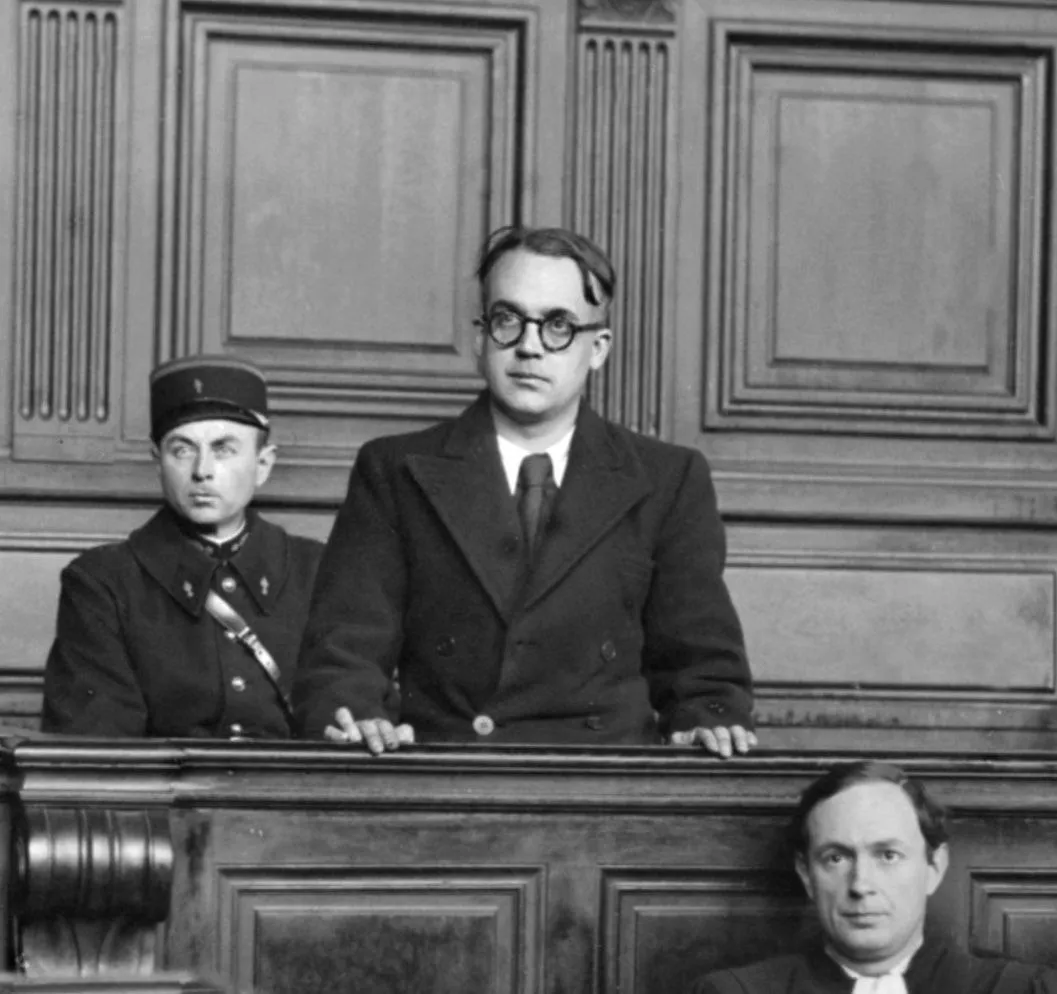Robert Brasillach, born on March 31, 1909, in Perpignan, emerged as a prominent fascist intellectual, engaging as a poet, novelist, journalist, playwright, and film critic. His foray into literature commenced at the tender age of fifteen with contributions to various publications, leading him to Paris in 1925 to pursue philosophy. This philosophical foundation paved the way for his ventures into drama and poetry. By twenty-six, alongside his brother-in-law Maurice Bardèche, Brasillach had penned an extensive History of Motion Pictures. He contributed a literary column to L’Étudiant français in the early 1930s.
His reaction to Mein Kampf in a 1935 letter to José Lupin was:
It is very truly the masterpiece of excited cretinism in which Hitler appears as a kind of enraged schoolteacher.
Brasillach’s rise in the literary world led him to the position of literary editor at L’Action française under Charles Maurras and to contributions at Je suis partout with renowned authors such as Ferdinand Céline and Pierre Drieu La Rochelle.
Following the Popular Front’s rise to power in 1936, Brasillach, at the helm of a dynamic young editorial team, steered Je suis partout toward fervent advocacy of international fascism, endorsing Mussolini’s regime and similar movements with a passion that often exceeded that of their countries of origin. He directed his criticism at seven forces he accused of dominating the world: communism, social democracy, religious organizations, Freemasonry, capitalism, and Judaism. He also contributed to the magazine Combat, initiated by Thierry Maulnier and Jean de Fabrègues. In 1939, Brasillach offered a narrative on the Spanish Civil War with History of the Spanish War.
World War II shifted perspectives for many at Je suis partout, with Brasillach becoming a prisoner of war in 1940, only to be released and return to publishing by mid-1941, backing the German war effort. On September 25, 1942, Brasillach advocated a complete separation from Jews. He criticized the Archbishop of Toulouse, Jules-Géraud Saliège, for speaking out against Jewish deportations, and the newspaper Je suis partout later mocked Saliège and other bishops for opposing the deportations, falsely framing them as mere relocations by the Gestapo. After the Allied invasion of North Africa, Brasillach criticized the Vichy regime’s leniency, suggesting extreme retaliation against Jews in France for any harm to French nationalists in Algiers. This period also marked Brasillach’s falling out with Charles Maurras after the former resumed his journalism in the occupied zone. Maurras disapproved of any collaboration with the Germans.
Under occupation, Brasillach’s work thrived, but following the liberation of Paris and the collapse of Je suis partout, many staff members were arrested, some executed or imprisoned, while others fled. Brasillach willingly turned himself in to the French Resistance in exchange for his family’s freedom and was rapidly brought to trial in January 1945. The proceedings revealed that despite accusations of pro-German collaboration, Brasillach had neither profited from his activities nor informed on others. Nonetheless, he was condemned for his journalistic stances, facing charges for an “offense of opinion,” with his articles serving as the primary evidence against him.
The trial concluded swiftly, with Brasillach receiving a death sentence after just twenty minutes of deliberation — a verdict delivered despite his military service as an officer and his capture by the Germans during the occupation of France. When the sentence was pronounced, an outcry from the audience labeled the ruling a “disgrace,” to which Brasillach responded, “No, it’s an honor.” A significant number of anti-fascist intellectuals — including Paul Valéry, Albert Camus, and Jean Cocteau — unsuccessfully petitioned General de Gaulle for Brasillach’s amnesty. Naturally, de Gaulle declined to grant clemency in the face of Brasillach’s conviction from what some regarded as a judicial spectacle.

Brasillach during the trial
Jean Lacouture suggested that General de Gaulle’s refusal to pardon Brasillach may have also been a strategic concession to the communists — who held significant power — to maintain a stance on other matters, as the communists vehemently wanted Brasillach punished for his support of fascism. De Gaulle later reflected in his memoirs that “talent is a title of responsibility,” implying that a writer’s talent, which amplifies his influence, should be considered an exacerbating factor in his judgment.
An intellectual is not less but more responsible than others. He is an instigator. He is a leader in the strongest sense. François Mauriac wrote to me that a thinking head must not fall. And why this privilege? A big head is more responsible than a stupid head! Brasillach was smart. He had talent. What he did is all the more serious. His commitment to collaboration strengthened the Nazis. An intellectual does not have more right to indulgence; he has less, because he is more informed, more capable of critical thinking, and therefore more guilty. An intellectual’s words are arrows; his formulas are bullets! They have the power to transform the public mind. He cannot enjoy the advantages of this power and refuse the disadvantages! When the time comes for justice, he must pay.
— Charles de Gaulle, quoted in This Was de Gaulle, vol. 2, by Alain Peyrefitte
During his final moments, Brasillach continued to create, leaving behind pieces like the Poèmes de Fresnes. Facing execution by firing squad on February 6, 1945, he approached his end with composure, choosing not to wear a blindfold and proclaiming, “Long live France, in spite of everything!” He now lies in the Charonne cemetery in the 20th arrondissement of Paris. After his death, Brasillach’s literary contributions, ranging from Virgil’s Presence to Letter to a Soldier of the Class of 1960, sustained his influence in literature. Alice Kaplan called him the “James Dean of French fascism,” and there is debate over whether his execution was a consequence of his ideological stance rather than actual wartime offenses. His trial and execution remain contentious, with some considering it a transgression against literary freedom in a democratic society, punishing him for his unorthodox views on Franco-German relations. Brasillach’s life, replete with theatrical elements, has been both glorified and cited as a cautionary tale.
And I, who in recent months have become so sharply disillusioned with so many errors of Italian Fascism, of German nationalism, of Spanish Falangism, can say that I will never forget the wonderful radiance of the universal Fascism of my youth, Fascism, the fever of our century.
— Robert Brasillach, Letter to a Soldier of the Class of 1960









